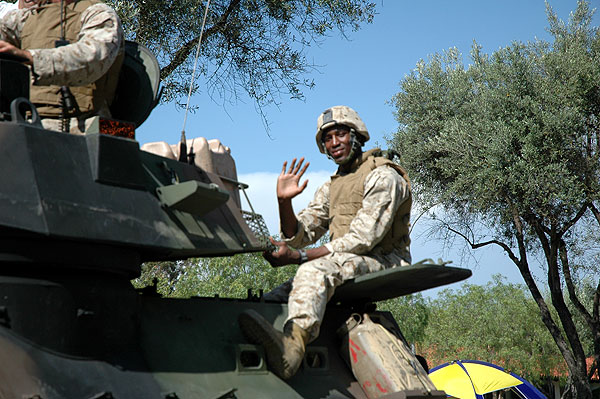America paused for the Fourth of July, or the public did, but world events spun on, and much happened. By the time everyone was back at work for a day or so it was time to think about it all. What to make of it?
Of course no commentator could resist what happened on the Fourth - you got to link "the rockets' red glare" line with the amazingly successful launch of the space shuttle after a two-year pause (chat up that national pride in our twenty-five-year-old technological wizardry) with, a few hours later, North Korea test firing seven missiles, one of them a long range gizmo that when operational could reach Hawaii or Alaska, or maybe Seattle or northern California. That one broke up or was "self-destructed" after forty-two seconds, falling in many pieces into the Sea of Japan. This rocket stuff is hard. It's even hard for us, and we're a real country, not some Mississippi-sized dirt poor backwater ruled by an egomaniacal oddball who tolerates no questions regarding his judgment. Well, we're a big country, and the major power in the world, able to do amazing things with our machines, even if our leader does have some similar but less pronounced odd traits.
The Fourth was, in any event, all about rockets. And it closed on an ominous note of threat - if the North Koreans can ever get that thing to work (doubtful), and if they have a nuclear weapon as they claim (never tested one and now one wonders about their bragging), and if they can overcome all the technical issues in reducing its size so it would fit on the tip of the big missile that doesn't work (decades of hard work for a country with first-rate technology), then we're in trouble, and it's worse for Japan, and far worse for our ally and supplier of cheap and reliable automobiles, South Korea, where we now have thirty thousand of our own troops. This is serious, sort of.
The response from our administration was muted - the world should get together and do something. Condemnation? Sanctions? Who knows? We haven't asked the UN or anyone at all, like Tony Blair, to agree that it would be wise to invade the country, toss out the government and bring in some exiles to run one that is more to our liking. Been there, done that, and it has its limitations.
So now what? Do we stress the threat, or if that's not going to fly (literally) do we emphasize the instability of the man in charge of that odd nation, or do we point out the incompetence and say this is serious, but not much of a worry and mock them? There was no talk of preemptive strikes to remove the threat, save for the few on the far right in love with whack-a-mole foreign policy - bomb anything in the world that looks suspicious and remove any government that looks at us sideways (diplomacy reduced to a single element, regime change). What do we want? It's puzzling, and very odd.
The real problem is, of course, that although they will probably never get the ICBM (the Taepodong-2) working, they will continue to sell the short range scud things to anyone with cash in hand, and you can put all sorts of nasty things on the tips of those - chemical agents and biological weapons. And the ones they keep can easily reach South Korea and parts of Japan. And too they may never have the competence to develop a nuclear weapon in a usable form, small enough to move out of the test area, but they do seem to have more and more plutonium in usable form, and they can sell that to anyone who might like some and does have the technology to do something with it. But that's the elephant in the room. No one is saying much about that. It's too scary, and the rocket thing is more dramatic. And we get to say, "See, we actually think diplomacy is a good idea, so stop busting our chops about the Iraq thing."
There's a lot of political theater going on here, and the real threat, and the best response, seem to be hidden.
But then political theater is what we do best. Thursday, July 6, was just another day in Baghdad, as noted here - a car bomber kills twelve and wounds forty-one as the day begins. This is the usual now, but we're told progress is being made (in passive voice of course, where who is making the progress is not given). Rod Nordland, Newsweek's chief foreign correspondent and their former Baghdad bureau chief, says not to worry, conditions in Iraq are "much worse" than they're described in the media over here. We're being had, or it's political theater or something. That's the implication in the interview he gives to Foreign Policy (here). As he explains, the administration does a "great job of managing the news" - and now the military has begun to crack down on embedded reporters. So we're getting the good news, or as good as can be reported -Before a journalist is allowed to go on an embed now, [the military] check[s] the work you have done previously. They want to know your slant on a story - they use the word "slant" - what you intend to write, and what you have written from embed trips before. If they don't like what you have done before, they refuse to take you. There are cases where individual reporters have been blacklisted because the military wasn't happy with the work they had done on embed.
Still, there only so much you can control, and reporters "get out among the Iraqi public a whole lot more than almost any American official, certainly more than military officials do." Bummer.
So it's obvious there's only so much the administration and the military can do to stage manage this - It is certainly hard to hide the fact that in the third year of this war, Iraqis are only getting electricity for about 5 to 10 percent of the day. Living conditions have gotten so much worse, violence is at an even higher tempo, and the country is on the verge of civil war. The administration has been successful to the extent that most Americans are not aware of just how dire it is and how little progress has been made. They keep talking about how the Iraqi army is doing much better and taking over responsibilities, but for the most part that's not true.
Oh. Now what?
Is it this bad? Here's an overall assessment from Kevin Drum in the Washington Monthly, thinking about North Korea business and the muddled response, and then about everything -But that's really just a single piece of a broader, and even more remarkable turn of events: the Bush administration literally seems to have no foreign policy at all anymore. They have no serious plan for Iraq, no plan for Iran, no plan for North Korea, no plan for democracy promotion, no plan for anything. With the neocons on the outs, Condoleezza Rice at the State Department, and Dick Cheney continuing to drift into an alternate universe at the OVP [Office of the Vice President], the Bush administration seems completely at sea. There's virtually no ideological coherency to their foreign policy that I can discern, and no credible follow-up on what little coherency is left. As near as I can tell, George Bush has learned that "There's evil in the world and we're going to stand up to it" isn't really adequate as a foreign policy for a superpower but is unable to figure out anything better to replace it with. So he spins his wheels, waiting for 2009. Unfortunately, the rest of us are left spinning with him.
That may be a bit too dismal, but consider other issues at play.
The Washington Post's Dan Froomkin gives a different overview -In his second inaugural address, President Bush spoke extravagantly about dedicating the United States to bringing liberty to every corner of the globe.
He made the measure of a president's foreign legacy clear as could be: "From the viewpoint of centuries, the questions that come to us are narrowed and few. Did our generation advance the cause of freedom? And did our character bring credit to that cause?"
And he expressed confidence that the answers to those questions would be in the affirmative: "America, in this young century, proclaims liberty throughout all the world, and to all the inhabitants thereof. Renewed in our strength -- tested, but not weary -- we are ready for the greatest achievements in the history of freedom."
But signs are that the foreign policy legacy Bush will leave behind could be a world in greater disarray than he found it.
And what's the evidence of that?
Of course there's the president saying there will be no significant pull-out of our troops from Iraq while he's president (here) - that's the next president's problem, not his.
And here the Post's Michael Abramowitz and Robin Wright seem to agree with Drum at the Washington Monthly -From deteriorating security in Afghanistan and Somalia to mayhem in the Middle East, confrontation with Iran and eroding relations with Russia, the White House suddenly sees crisis in every direction.
North Korea's long-range missile test Tuesday, although unsuccessful, was another reminder of the bleak foreign policy landscape that faces President Bush even outside of Iraq. Few foreign policy experts foresee the reclusive Stalinist state giving up the nuclear weapons it appears to have acquired, making it another in a long list of world problems that threaten to cloud the closing years of the Bush administration, according to foreign policy experts in both parties.
... the events on the Korean Peninsula underscored how the administration has lost the initiative it once possessed on foreign policy in the aftermath of the Iraq invasion, leaving at risk the central Bush aspiration of democracy-building around the world.
They also showed how the huge commitment of resources and time on Iraq - and the attendant falloff in international support for the United States - has limited the administration's flexibility in handling new world crises.
The New York Times (David E. Sanger) piles on -The Bush administration has tried to ignore North Korea, then, reluctantly, to engage it, and then to squeeze its bankers in a manner intended to make the country's leader, Kim Jong Il, personally feel the pinch.
Yet none of these steps in the past six years has worked. So now, after a barrage of missile launchings by North Korea, President Bush and his national security advisers found themselves on Wednesday facing what one close aide described as an array of "familiar bad choices."
... [the big question is ]whether the president is prepared to leave office in 2009 without constraining an unpredictable dictator who boasts about having a nuclear arsenal.
... Another alternative for Mr. Bush would be take a hard line that might risk an escalation of the half-century-old confrontation between the United States and North Korea. But such a tack is now complicated by the widespread assumption that even if the North does not have the ability to launch a nuclear weapon, it now probably possesses enough extra nuclear fuel that it may be tempted to sell some to a terrorist group or another state.
Oh that.
And the Los Angeles Times out here is noting that even the South Koreans aren't too happy - "'The United States is a paper tiger,' said Song Yong-sun, a military expert who serves in South Korea's National Assembly as part of the conservative opposition party. Referring to the North Korean leader, she added, 'Kim Jong Il knows very well that Bush isn't going to do anything to punish him.'"
But the Post's Dana Milbank finds some comedy in all the theatrics -When the going on the Korean Peninsula gets tough, the tough go on a doughnut run.
President Bush, making his first public remarks since North Korea test-fired seven missiles in open defiance of the United States, boarded his motorcade yesterday for an unannounced trip to a doughnut shop in Alexandria - to talk about immigration.
... After interpreting every gesture of Saddam Hussein as a casus belli, a changed Bush administration is taking the opposite approach with Kim Jong Il. Officials were determined not to give the little man with the big missile the attention he craves.
Mmmm, doughnuts, as Homer Simpson would say.
The political theater gets more and more absurd. What are we to believe about the grand plan and how it's going? Are we to worry, or not worry? Is there a plan, or should we also have a doughnut and relax?
And what about the other leg of the Axis if Evil, Iran? What's the plan there? According to this in "perhaps the biggest foreign policy shift" of his presidency, the man at the top reversed course last month on his approach - agreeing to join talks with the Iranian government on the condition that it suspended its uranium enrichment. Yeah, yeah, but lots of people think this was a sham - setting up conditions they wouldn't accept so we could say that they were refusing to deal with us and it was time to bomb the snot out of them so they'd never have any weapons of this sort (and maybe their people would rise up and welcome us with sweets and flowers as we fly in a bunch of exiles to run the place).
The weekend before the Fourth Seymour Hersh was doing it again in the New Yorker with this, saying this reversal of course was really "an unspoken threat: the U.S. Strategic Command, supported by the Air Force, has been drawing up plans, at the President's direction, for a major bombing campaign in Iran."
Hersh has a track record of exposing what's really going on, from that village in Vietnam and the massacre to Abu Ghraib. And this time it's stuff like this -Inside the Pentagon, senior commanders have increasingly challenged the President's plans, according to active-duty and retired officers and officials. The generals and admirals have told the Administration that the bombing campaign will probably not succeed in destroying Iran's nuclear program. They have also warned that an attack could lead to serious economic, political, and military consequences for the United States.
... In late April, the military leadership, headed by General Pace, achieved a major victory when the White House dropped its insistence that the plan for a bombing campaign include the possible use of a nuclear device to destroy Iran's uranium-enrichment plant at Natanz, nearly two hundred miles south of Tehran. ... "Bush and Cheney were dead serious about the nuclear planning," [a] former senior intelligence official told me." And Pace stood up to them. Then the world came back: "O.K., the nuclear option is politically unacceptable."
This is big stuff, released on a bad weekend for news, and overwhelmed by the North Korea business. We plan to bomb the snot out of them, no matter what anyone thinks, and no matter what we're saying on the record, but the generals at least got the nuclear strikes off the table.
That's interesting political theater - the generals stop the crazies. You could shop that one out here in Hollywood.
But then, it's an elections year, and some crazy stuff is bound to come up, like this in the Miami Herald -A wide-ranging report on U.S. policies toward Cuba's possible transition to democracy was officially presented to President Bush at a meeting Wednesday of the White House's National Security Council.
The report by the Commission for Assistance to a Free Cuba, co-chaired by Secretary of State Condoleezza Rice and the Cuban-American Secretary of Commerce, Carlos Gutierrez, makes recommendations to hasten the end of the island's communist government and assist the transition.
An early draft obtained last week by The Miami Herald included recommendations to create an $80 million fund to support democracy on the island, launch a diplomatic initiative to undermine Venezuela's backing of Castro and tighten the enforcement of the economic embargo against Cuba.
What? We're going after Cuba and Venezuela, because we need something to do? A bit more foreign intervention, because the American public will eat it up? We know how they should run their countries?
See Reuters here -Two senior Cuban officials charged on Wednesday that a report on the communist nation delivered to the Bush administration's National Security Council amounted to a blueprint for an Iraq-style regime change in the Caribbean.
... The first chapter, entitled 'Hastening the End of the Castro Dictatorship: Transition not Succession,' includes a separate 'classified annex' of recommended actions.
"You can't accomplish what they propose without an invasion, without a war.
... This plan implies a U.S. military invasion of Cuba, a direct U.S. intervention," said Bruno Rodriquez, First Vice Minister of Foreign Affairs.
But it worked so well in Iraq? Something about this is very odd.
It's not like these guys have learned nothing. You just have to keep doing this invade, remove the government, occupy until the exiles you bring in take over, until you get it right. The concept isn't wrong because it hasn't worked yet. The idea is it could, theoretically, and you keep trying no matter how many times it fails, because you know it should work. You could shop that one out here in Hollywood too - a major motion picture with the working title "American Quixote - To Dream the Impossible Dream."
So what is the American Dream now - to subvert other governments or overthrow them outright, to release the hidden American on everyone all around the world?
Christopher Dickey, in American Dream, American Nightmare writing from Paris is the latest issue of Newsweek -I spent the early morning yesterday in my Paris apartment re-reading George Orwell's long essay, "Notes on Nationalism." It was written in 1945, but seemed the right thing for this year's Fourth of July when so many expressions of nationalism are in the air: the relatively benign World Cup competition, the blood-soaked tension between the Palestinians and Israelis and the ferocious violence of the war in Iraq.
Orwell wrote that nationalism is partly "the habit of assuming that human beings can be classified like insects." He said it's not to be confused with patriotism, which Orwell defined as "devotion to a particular place and a particular way of life, which one believes to be the best in the world but has no wish to force upon other people."
July 4, I would argue, is a patriotic holiday in just that sense-a true celebration of so much that makes the United States of America unique. It's the party thrown by a nation of immigrants to mark the creation of something new on the face of the earth, a society devoted not to the past but to the future - the incredibly elegant vision of "certain inalienable rights" to "life, liberty and the pursuit of happiness."
That's what the flags and the fireworks, the anthems, the civilians with hands on hearts, the soldiers at attention and saluting, the embassy receptions, and, yeah, not a few mind-bending beer-drinking binges, are most often about. I think most of us know in our hearts that the more we live up to our particular way of life, the more attractive it will be to others and the more they are likely to use its ideals to better their own lives. That's worth saluting, for sure, and raising a glass, too.
But American nationalism, unlike American patriotism, is different - and dangerous.
Dangerous? He quotes Orwell on nationalism, who defines it as identifying your country, or you way of seeing the world, and your very identity - "placing it beyond good and evil and recognizing no other duty than that of advancing its interests." The nationalist's thoughts "always turn on victories, defeats, triumphs and humiliations. ... Nationalism is power-hunger tempered by self-deception." So patriotism is essentially about ideas and pride, while nationalism is about something lese entirely. Orwell - "Political and military commentators, like astrologers, can survive almost any mistake, because their more devoted followers do not look to them for an appraisal of the facts but for the stimulation of nationalistic loyalties."
We're there -All nationalists have the power of not seeing resemblances between similar sets of facts. Actions are held to be good or bad, not on their own merits but according to who does them, and there is almost no kind of outrage-torture, the use of hostages, forced labor, mass deportations, imprisonment without trial, forgery, assassination, the bombing of civilians-which does not change its moral color when committed by 'our' side.
... The nationalist not only does not disapprove of atrocities committed by his own side, but has a remarkable capacity for not even hearing about them.
Yep, Orwell is onto something. We're definitely there and so are the Israelis this week, and everyone else, as Dickey notes -Is Israel's current strategy of crippling the rudimentary infrastructure of Gaza, forcing one million people to suffer for the kidnapping of one Israeli soldier, in any way proportional? No, nor humane, nor very relevant to winning his release. But it fits into a nationalist narrative that says the only way to deal with Palestinians is to hand them one humiliating collective defeat after another. Is a Muslim fanatic's slaughter of innocent Israelis at a night club an act of heroic martyrdom? What about the denial of the Holocaust by Iran's president? The only way to justify such talk is with the particularly cruel know-nothingism of our times.
There are certainly patriotic Israelis and Palestinians who do realize that they have to allow for each other's fears and each other's pride. But patriotism is in short supply on both sides, and nationalism is rampant. Orwell would have understood.
It's a distinction between two different things that has been lost.
As for Americans and their values, which may not be transcendent, Dickey says this -We are, yes, very materialistic. You could see that in the long list of corporate sponsors for yesterday's July 4 reception at the American ambassador's residence in Paris. But much more importantly, you can hear materialism in the way we talk about almost everything, from the family we have, to the faith we have, the house we have, the cars and diplomas and the jobs we have. We pushed westward because we wanted to have land, which was almost free, and we wanted to have the freedom to forget whatever histories bound us to the past. Ours has become a society based on "having" in a way that's almost indistinguishable from "the American dream," or indeed, "the pursuit of happiness." There's no need to apologize. That's what makes us who we are.
But in much of the old world, people do not "have" families; they belong to families, which belong sometimes to clans and tribes (the extended families we inevitably describe in pejorative terms). Those families belong to a land and a faith-and a history of that land and faith-that may go back thousands of years. Their patriotism is in their blood, not just their hopes, and so is their nationalism.
As we saw in the Balkans in the 1990s, this history-driven, blood-driven nationalism can become brutally racist and explosively xenophobic: we belong, you do not. In Africa, the forces of tribally based nationalism constantly threaten the future of a continent where most national borders were drawn by foreigners. In Iraq, well, we Americans have helped tear apart a state that now shudders at the brink of utter failure in the face of ever-strengthening sectarian and racial nationalisms.
What does not help in the process of encouraging peace (because no one is going to "bring" peace), is the notion that we Americans can apply our nationalist vision to people who never chose to participate in our immigrant aspirations to begin with: people who feel safer, stronger and saner in their worlds of belonging than in our world of having. When we make that mistake, threatening to the core their sense of who they are, all we do is invite hatred.
"The pursuit of happiness" is, indeed, what the Fourth of July is all about, and I'd like to see that wonderfully vague and evocative principle accepted universally as an inalienable right. But let's never imagine that the pursuit of happiness is, everywhere, the same as the pursuit of the American dream. That's something we can share, but never impose.
There's a lesson here. Don't read Orwell in Paris.
Oh yes, there was other news - in the middle of all this Ken Lay died of a heart attack. What's to say?
See Mimi Swartz, the executive editor of Texas Monthly and co-author of Power Failure, the Inside Story of the Collapse of Enron with this -After watching him self-immolate on the witness stand, I was sure that Ken Lay, Enron's former CEO who died early this morning, had lost for good one of the skills that made him famous and successful - an unerring sense of PR. It was a gift that saw him through his early years at Enron but then seemed to vanish as the company imploded and the legal case against him proceeded to its Shakespearean end. As has been often noted in the press, Lay was so bad on the witness stand - testy, arrogant, imperious, and that was with his own lawyers - that many believe that he not only did himself in but also took former Enron CEO Jeff Skilling down with him. Now it appears that in death he has redeemed himself, at least as far as spinning his own story is concerned.
Lay was always a cipher to those who knew there must be more to the man than his public persona as a folksy, jovial optimist - the one who, after the guilty verdict, insisted that God was on his side and would watch over him during this difficult time. (Was he an idiot or a crook? I repeatedly asked myself this as the Enron story unfolded.) Here in Houston, Texas, he always managed to inspire more ambivalence than his co-defendant Skilling. Before Enron's collapse, Lay lived lavishly - renting a yacht called the Amnesia for a special-occasion cruise, paying tens of thousands to reserve just the right ski trip months ahead of time - but he still managed to keep his reputation as Mr. Houston, raising money for good causes like the United Way, nudging the Greater Houston Partnership toward modernity, and forging compromises between local feuding fiefdoms.
Few managed to catch sight of any arrogance in company business deals, except some grumbling energy competitors, who never figured out how he maintained the public mien of a devout small-town mayor who only wanted the best for everyone. That crackling, semistentorian voice still tinged with his Missouri accent; that politician-like memory for personal details; his penchant to do the right thing, which he sometimes demonstrated with an African-American minister or two in tow (the latter he was still doing at trial) - these were qualities and gifts and shrewd choices that made it hard for locals to see Ken Lay as a bad guy. That is until prosecutor John Hueston plastered Lay's American Express bills on an overhead projector for all the world to see.
The guilty verdict seemed to settle things around here, temporarily, at least.
... Now, the news of Lay's death will, most likely, give credence to his latest identity - that of corporate martyr. Questions about a potential suicide were all over talk radio this morning, as well as crazier theories, like one that the Bush administration was responsible for his death and one that he had faked his own demise.
... So, Lay manages to pass into history as a semitragic figure instead of a laughingstock - the family man, devoted husband, and all-around good guy he always claimed to be.
... Nice going, Kenny boy, is all I can say.
You could shop that one out here in Hollywood too. It's all theater.
Of course it's hard to remember the four basic plots of all movies that they refer to out here in Hollywood. It may be seven. Or it may be just one - boy gets girl, boy loses girl, boy gets girl back (add whatever details you'd like, but that's it). Too there's the noble loner rescues the hapless, cowardly townsfolk (or some variation) and rides off into the sunset. High Noon. That's two. And there's the weak person through seemingly impossible troubles discovers his or her inner strength and triumphs. Luke Skywalker. Frodo Baggins. You sometimes can weave that into the first two. You get the idea. There are only so many plots to go around.
It's the same in politics, as Stephen Denning, notes here -What's the story that the new leaders will need to communicate? In broad outline, we know what it will be, both for Democrats and Republicans, since as Robert Reich has explained, there are only four stories in American politics:
• The Triumphant Individual - This is the familiar tale of the little guy who works hard, takes risks, believes in himself, and eventually gains wealth, fame, and honor. Although the Democrats, given their alliance with labor, used to own this story, the Republicans took it over by offering lower taxes. After six years of profligate spending, that won't win this argument much longer. The winning narrative for both Republicans and Democrats must recognize that without resolving the crises in health and education, the economic future is bleak and there will be no triumphant individual.
• The Benevolent Community - "I have a dream," said Martin Luther King Jr and JFK asked us what we could do for our country. Democrats used to own this issue until they became associated with failed poverty programs and handouts for the poor. Now Republicans are also in trouble as Katrina showed the unattractive reality of "compassionate conservatism" at home and the trashing of our allies has left America despised abroad. The winning narrative for both Democrats and Republicans here must obviously re-establish competence in coping with poverty and deprivation at home, while rekindling a spirit of internationalism abroad to solve global problems.
• The Mob at the Gates used to be the Nazis and then the Soviet evil empire. Now it's terrorists, against whom we must maintain vigilance, lest diabolical forces overwhelm us. In recent times, Republicans have owned this story, but as disillusion with Iraq deepens and broadens, both Republicans and Democrats will have to recognize that the war on terror has been a war in error, and will need to wind down the misguided adventure in Iraq, sooner rather than later, so that energies and resources can refocused on real enemies.
• The Rot at the Top - Since the other three stories are usually so similar for both parties, the "rot at the top" story is usually the pivotal one in leading to change. With Richard Nixon, it was political malfeasance. With George H.W. Bush, it was economic incompetence. With Clinton, it was personal immorality. Now Democrats have abundant evidence that Republicans embody a culture of incompetence and corruption, while Republicans try to paint Democrats as divided, effete, liberal, pro-gay and anti-marriage and opposed to God.
As you see, those in charge now have mastered the first and third plots. On the second and fourth they're vulnerable.
As noted here long ago, Americans want to be told "the real story" - with a narrative already provided to make it all fit together from crisis to resolution. And of course we also require a denouement - to be told what the story means to the next election or whatever. And such a denouement is thus a teaser for the next episode. Stay tuned. (See Tell Me a Story from May 29, 2003.) Our minds are conditioned to see things in narrative terms.
So we get political theater. The narratives play out.













